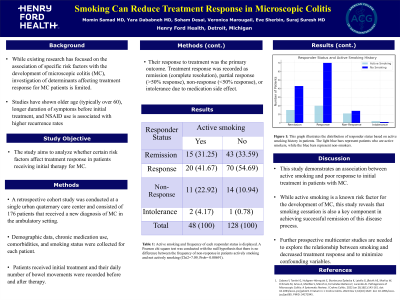Monday Poster Session
Category: Colon
P1940 - Smoking Can Reduce Treatment Response in Microscopic Colitis
Monday, October 28, 2024
10:30 AM - 4:00 PM ET
Location: Exhibit Hall E

Has Audio

Momin Samad, MD
Henry Ford Hospital
Rochester Hills, MI
Presenting Author(s)
Momin Samad, MD1, Soham Desai, 2, Veronica Marougail, 3, Eve Sherbin, 4, Abdulmalik Saleem, MD5, Yara JN. Dababneh, MD5, Suraj Suresh, MD5
1Henry Ford Hospital, Rochester Hills, MI; 2Wayne State University, Detroit, MI; 3Wayne State School of Medicine, Detroit, MI; 4Wayne State University School of Medicine, Detroit, MI; 5Henry Ford Health, Detroit, MI
Introduction: While existing research has focused on the association of specific risk factors with the development of microscopic colitis (MC), investigation of determinants affecting treatment response for MC patients is limited. The study aims to analyze whether certain risk factors affect treatment response in patients receiving initial therapy for MC.
Methods: A retrospective cohort study was conducted at a single urban quaternary care center and consisted of 176 patients that received a new diagnosis of MC in the ambulatory setting. Demographic data, chronic medication use, comorbidities, and smoking status were collected for each patient. Patients received initial treatment and their daily number of bowel movements were recorded before and after therapy. Their response to treatment was the primary outcome. Treatment response was recorded as remission (complete resolution), partial response ( >50% response), non-response (< 50% response), or intolerance due to medication side effect.
Results: In total, 58 patients (33% of total cohort) achieved clinical remission while 90 (51%) had a partial response and 25 (14%) patients had no response to treatment. An additional 3 (2%) patients had intolerance to initial treatment. A univariate analysis assessing individual risk factors revealed that patients who were actively smoking had a significantly higher frequency of non-response to initial therapy (22%) compared to non-smokers (10%) (P= 0.007). No other risk factors studied had a significant effect on response to initial treatment in MC.
Discussion: This study demonstrates an association between active smoking and poor response to initial treatment in patients with MC. While active smoking is a known risk factor for the development of MC, this study reveals that smoking cessation is also a key component in achieving successful remission of this disease process. Further prospective multicenter studies are needed to explore the relationship between smoking and decreased treatment response and to minimize confounding variables.
Note: The table for this abstract can be viewed in the ePoster Gallery section of the ACG 2024 ePoster Site or in The American Journal of Gastroenterology's abstract supplement issue, both of which will be available starting October 27, 2024.
Disclosures:
Momin Samad, MD1, Soham Desai, 2, Veronica Marougail, 3, Eve Sherbin, 4, Abdulmalik Saleem, MD5, Yara JN. Dababneh, MD5, Suraj Suresh, MD5. P1940 - Smoking Can Reduce Treatment Response in Microscopic Colitis, ACG 2024 Annual Scientific Meeting Abstracts. Philadelphia, PA: American College of Gastroenterology.
1Henry Ford Hospital, Rochester Hills, MI; 2Wayne State University, Detroit, MI; 3Wayne State School of Medicine, Detroit, MI; 4Wayne State University School of Medicine, Detroit, MI; 5Henry Ford Health, Detroit, MI
Introduction: While existing research has focused on the association of specific risk factors with the development of microscopic colitis (MC), investigation of determinants affecting treatment response for MC patients is limited. The study aims to analyze whether certain risk factors affect treatment response in patients receiving initial therapy for MC.
Methods: A retrospective cohort study was conducted at a single urban quaternary care center and consisted of 176 patients that received a new diagnosis of MC in the ambulatory setting. Demographic data, chronic medication use, comorbidities, and smoking status were collected for each patient. Patients received initial treatment and their daily number of bowel movements were recorded before and after therapy. Their response to treatment was the primary outcome. Treatment response was recorded as remission (complete resolution), partial response ( >50% response), non-response (< 50% response), or intolerance due to medication side effect.
Results: In total, 58 patients (33% of total cohort) achieved clinical remission while 90 (51%) had a partial response and 25 (14%) patients had no response to treatment. An additional 3 (2%) patients had intolerance to initial treatment. A univariate analysis assessing individual risk factors revealed that patients who were actively smoking had a significantly higher frequency of non-response to initial therapy (22%) compared to non-smokers (10%) (P= 0.007). No other risk factors studied had a significant effect on response to initial treatment in MC.
Discussion: This study demonstrates an association between active smoking and poor response to initial treatment in patients with MC. While active smoking is a known risk factor for the development of MC, this study reveals that smoking cessation is also a key component in achieving successful remission of this disease process. Further prospective multicenter studies are needed to explore the relationship between smoking and decreased treatment response and to minimize confounding variables.
Note: The table for this abstract can be viewed in the ePoster Gallery section of the ACG 2024 ePoster Site or in The American Journal of Gastroenterology's abstract supplement issue, both of which will be available starting October 27, 2024.
Disclosures:
Momin Samad indicated no relevant financial relationships.
Soham Desai indicated no relevant financial relationships.
Veronica Marougail indicated no relevant financial relationships.
Eve Sherbin indicated no relevant financial relationships.
Abdulmalik Saleem indicated no relevant financial relationships.
Yara Dababneh indicated no relevant financial relationships.
Suraj Suresh indicated no relevant financial relationships.
Momin Samad, MD1, Soham Desai, 2, Veronica Marougail, 3, Eve Sherbin, 4, Abdulmalik Saleem, MD5, Yara JN. Dababneh, MD5, Suraj Suresh, MD5. P1940 - Smoking Can Reduce Treatment Response in Microscopic Colitis, ACG 2024 Annual Scientific Meeting Abstracts. Philadelphia, PA: American College of Gastroenterology.
